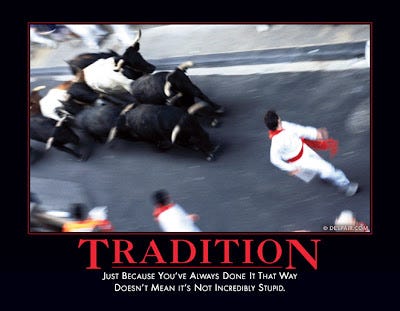Throwback Thursday: “That’s the way we’ve always done it!” The logical fallacy of the appeal to tradition

“That’s the way we’ve always done it!” This is the logical fallacy of the appeal to tradition (Latin: argumentum ad antiquitatem). In family, business, and even church circles, you see this phrase used ad nauseum when it comes to setting a direction or even considering changing course. I have already posted some on this subject, stating that this is a lazy and unproductive way to lead an institution because it requires no thought. I’ll go a step further: it’s lazy because it exclusively borrows the thinking of someone else without question—especially if it’s brought about the desired results.
Both sides of the religion argument employ this:
A: I believe in God.
B: Why?
A: People have believed in the existence of God for thousands of years. A belief like that would last that long if it was wrong, right? [Source]
I know there are legitimate reasons to believe in the existence of God, mind you. But this appeal to tradition is a flimsy argument when much better arguments could be made (this is for a later time).
In church circles, this can happen:
A: Mom, why do we have a service on Sunday nights?
B: Because that’s the way our church has always gone about things: Sunday morning service, and a Sunday night service—and don’t forget about Sunday School.
The Pharisees were warned about traditions that were elevated too highly.
Now when the Pharisees gathered to him, with some of the scribes who had come from Jerusalem, 2 they saw that some of his disciples ate with hands that were defiled, that is, unwashed. 3 (For the Pharisees and all the Jews do not eat unless they wash their hands properly, holding to the tradition of the elders, 4 and when they come from the marketplace, they do not eat unless they wash. And there are many other traditions that they observe, such as the washing ofcups and pots and copper vessels and dining couches.) 5 And the Pharisees and the scribes asked him, “Why do your disciples not walk according tothe tradition of the elders, but eat with defiled hands?” 6 And he said to them,“Well did Isaiah prophesy of you hypocrites, as it is written,
“‘This people honors me with their lips, but their heart is far from me; 7 in vain do they worship me, teaching as doctrines the commandments of men.’
8 You leave the commandment of God and hold to the tradition of men.”
9 And he said to them, “You have a fine way of rejecting the commandment of God in order to establish your tradition! 10 For Moses said, ‘Honor your father and your mother’; and,‘Whoever reviles father or mother must surely die.’ 11 But you say, ‘If a man tells his father or his mother, “Whatever you would have gained from me is Corban”’ (that is, given to God)— 12 then you no longer permit him to do anything for his father or mother, 13 thus making void the word of God by your tradition that you have handed down. And many such things you do.”
"Holding to the tradition of the elders”—that was the criteria rather than the pure, simple Word of God! We hold to our traditions so closely at time that we treat them as if they came down from the mountain as God’s holy commands.
Let’s be aware of this fallacy. It can stifle an organization more quickly than one can imagine.


